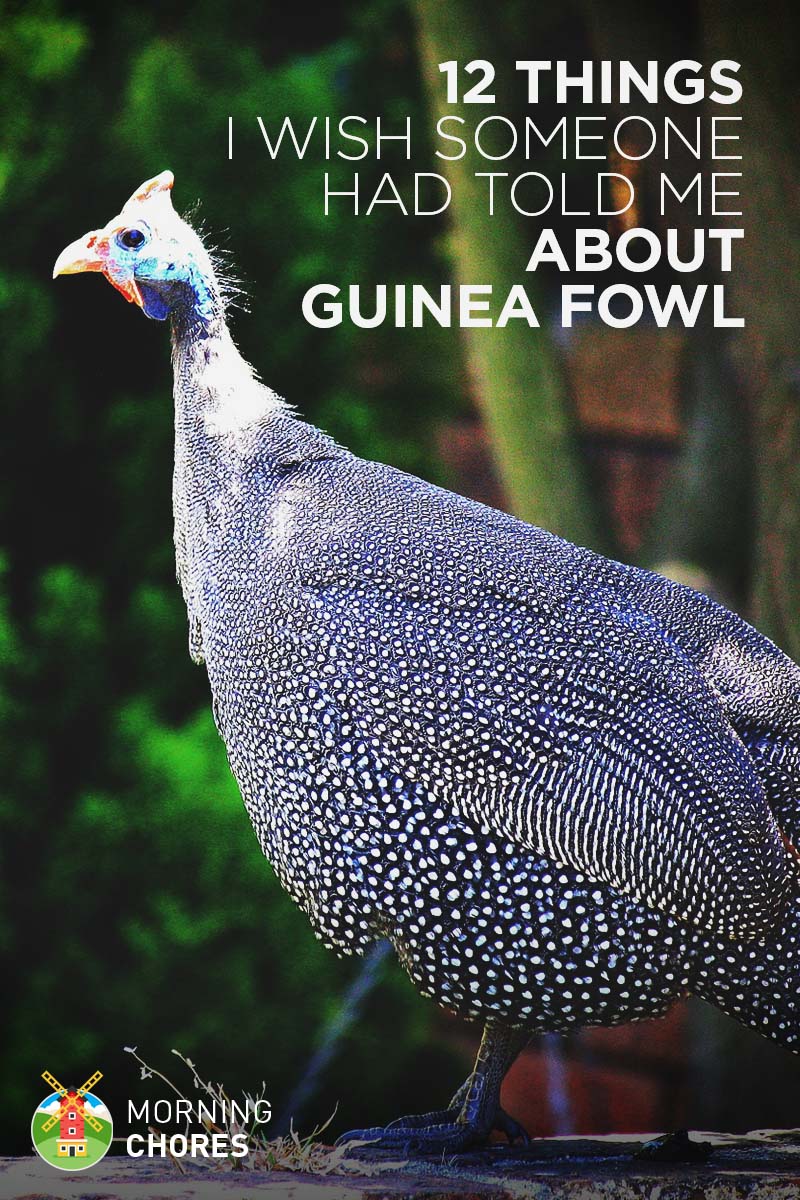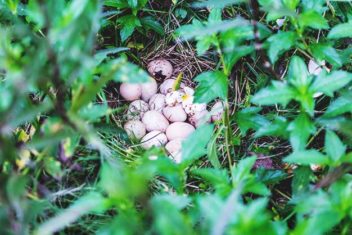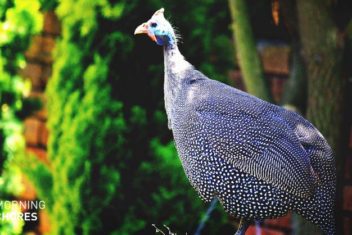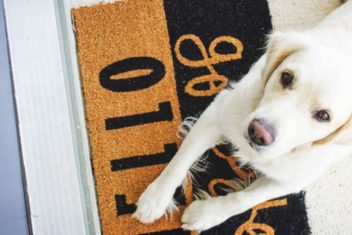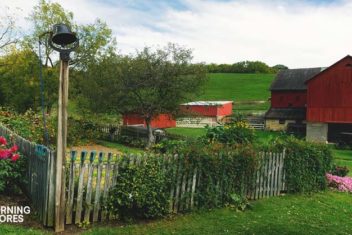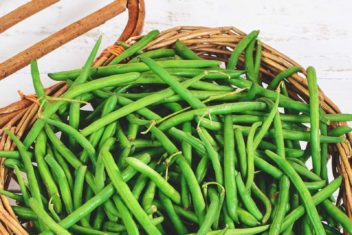Is that a turkey?
Well, no. It’s a guinea fowl.
That is what many people ask when they first pull into a homestead to see these birds shuffling around.
We took the plunge into guinea fowl about a year ago, and boy was it an eye-opening experience.
Don’t get me wrong, I have grown to love our guineas very much, but it has taken some serious getting used to.
This is why I wanted to share with you a list of things I wish someone had told me before bringing them home.
1. A Guinea Is Not A Chicken
You might be thinking, “Well, duh!”
But I mean they are not even remotely the same.
Chickens are very domesticated birds. You can coop them, free-range them, or do half and half.
Chickens are fine with both.
Guineas are not the same. Unless you clip their wings extremely short, they are going to get out of the coop. That is actually a good thing if you have them for any reason beyond meat and eggs.
Guineas are also very dominant.
So don’t be surprised if they end up running your coop. Our guineas have completely taken over.
Our chickens were adjusted eventually, but you know the guineas have entered the coop when you look out and even the rooster is in the nesting boxes trying to get out of their way.
Don’t let this deter you from keeping your chickens and guineas together. Guinea fowl become tamer when allowed to interact with chickens.
2. Guineas Know No Boundaries
I’m not sure if you’ve noticed, but chickens know when they are off of their turf. I’m not sure how, but they do.
Well, guineas are not like that.
Not in the slightest.
Guineas will walk onto a road and think they own it. They will take over the neighbor’s yard if they so desire.
They know no boundaries.
When we first got our guineas, they not only took over our yard and chicken coop but our neighbor’s too. Thankfully, he was a good sport about it.
But most Saturday mornings I’d go out to feed the animals and sure enough, my neighbor would go into his coop and find my guinea rooster roosting in his coop.
So in the midst of feeding animals, he’d catch them and pass them over the fence to me. Talk about embarrassing.
But our neighbors have grown to enjoy the benefits of guineas too, so it all worked out.
Plus, all homesteaders know that animals have a mind of their own. So my guineas go up to visit our neighbors and their goats come down to visit us on occasion.
3. They Are ‘Chatty Cathy’
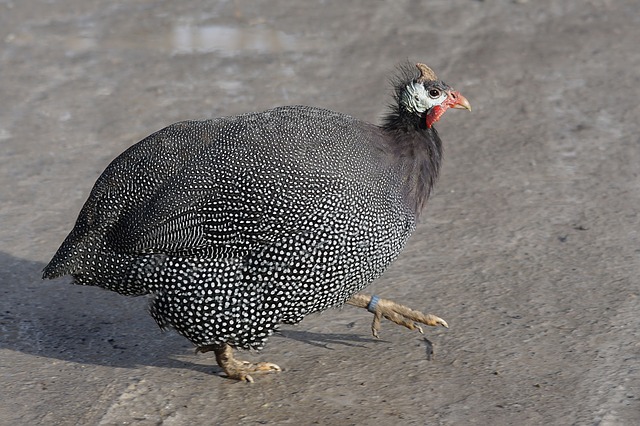
Guinea fowl are ‘Chatty Cathy’.
They talk all of the time.
The hens make a noise that sounds like they are saying, “Come back. Come back,” while the roosters make a “Chi chi chi” sound.
This is the main way you can tell your males and females apart.
Not only do they converse a lot, but they do it loudly.
I can’t emphasize this point enough.
Guineas are loud creatures. It can be annoying at times, but you either choose to embrace it, or guineas aren’t your cup of tea.
I’ve chosen to embrace it.
4. Who Needs ADT When You Have Guineas?
This is a great benefit of owning guineas.
I was not prepared for how great of watchdogs these birds were going to be for our homestead.
We don’t have a lot of predators around our homestead, but we did have a stray dog problem.
We raise meat rabbits and unfortunately, these stray dogs had figured out we had them. It got to a point where we were going outside every morning to either find a hutch destroyed or a rabbit missing.
We tried everything to catch them in the act but never had any luck. Then the dogs started getting more brazen and showing up in the middle of the day.
They were fast. As soon as we’d come out to find them, they’d be gone.
Then we got guineas.
I heard the guineas going nuts the first few days they were released on the property. I went outside to check out what was going on, and sure enough, there stood one of those stray dogs.
It was so afraid of them that eventually, our dog problem ceased.
We had a few stray cats stalking our chickens as well. A cat tried to stalk our guinea rooster one day, and he actually let the cat pounce.
As soon as the cat pounced, the guinea flew over his head and attacked him. We no longer have a stray cat problem either.
They will guard your animals and property against both predators and people that should not be around.
They are great to have for this reason alone.
5. You Don’t Need The Orkin Man—You Need Guineas
Our property was once completely wooded. We have since cleared a lot of it in order to homestead, but we still had a pest problem.
We had ticks everywhere and every year we had to do battle in our garden because of June Bugs.
Our middle son came in one day with a giant tick on him. He had the ring around the bite so off to the doctor we went for antibiotics.
That day is what led us to guineas. My husband made an executive decision and a few days later we were the proud owner of our first guineas.
Since we have had guineas, we don’t have bugs.
They go all throughout the woods, in the different animals’ areas, in the garden, and all over the yard.
Bugs don’t stand a chance.
This is another huge benefit to owning guineas.
6. Guineas Must Be Trained
As mentioned earlier, guineas are not very domesticated birds.
They don’t actually require a coop. They will roost in the trees.
However, if you want them to come home and roost then they’ll need a coop.
If you decide to start with keets, you raise them basically as you would a baby chick or duckling. They require a brooder box and starter feed.
They need to be protected from the wind and kept warm for the first few weeks.
You can also raise guinea fowl from adults.
We have done both.
Our first go-round with guineas we raised day old keets. We raised them all the way up until they were ready to start free-ranging, and we messed up big time.
We let them all go at once.
Guineas travel in close-knit groups so once they are all out and gone, they are gone if they aren’t trained that this is home.
The next go-round we bought only adults.
We cooped them for about six weeks. Then we let them out one at a time. We would release a new guinea about every day or so.
Because they won’t leave each other, they had to keep coming home to roost.
By the time all of our guineas were released, they knew that this was home.
This is what you’ll need to do whether you raise them from keets or not.
Giving them a coop with food, water, and roosts will entice them to come home every day more so than if you just let them roost in the trees.
7. Guineas Are Poor Mothers
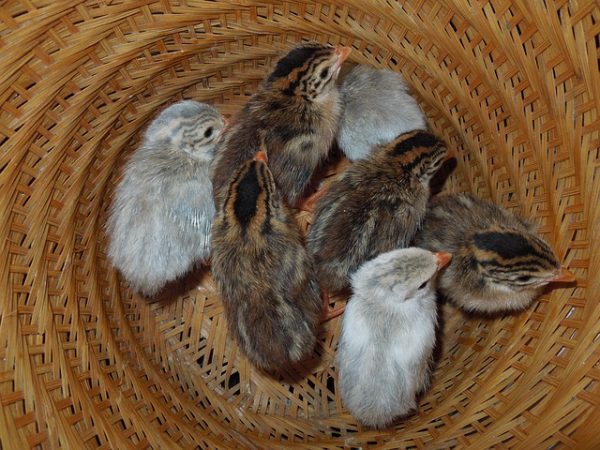
Guinea fowl are fast-paced, flighty birds.
They are also seasonal layers. They prefer to nest on the ground instead of nesting boxes as chickens do.
It takes guineas about 26-28 days to hatch a full clutch.
A lot of times they will make a nest off in the woods. If you find it, it is a good idea to move the nest back to the coop.
Guineas are usually great setters.
The problem is that once the eggs hatch, the moms are off and running again. They take their babies through wet areas which can cause them to chill and ultimately die.
So what do you do if you want to raise those baby guineas?
You have two options:
- Put the guinea eggs under a broody hen. She will raise them as her own and take great care of them.
- Incubate the eggs and raise them as you would day old keets that you purchased.
If you leave things in the hand of a guinea hen, sadly, the keets will probably not survive.
8. Fly Away Little Guinea
Have I told you yet that guineas are nothing like chickens?
Well, they aren’t.
Chickens don’t really fly. They can use their wings to help them slightly hop to high places, but they don’t soar.
Guineas fly.
I’m talking like actually take flight.
It is nothing for our guinea fowl to fly on top of our house. They sit on our fence posts with ease.
If something scares them, they’ll just fly right over it.
I’ve even seen my guineas walking back from my mother-in-law’s house which is across from our house.
They got tired of walking up the driveway, so they just flew from the bottom of our driveway over our house, and into the farthest corner of our backyard with no problem.
I was not aware of this when we got them. I imagined them to fly like a chicken flies.
The first time I saw them soar over our house, it was amazing.
So just be prepared that they will actually soar longer distances than you’d probably think.
9. Guineas Are Excellent Gardeners
I already mentioned that guineas are great at eating bugs. They have saved our garden from being ravaged by the June Bugs.
I am so thankful for that!
What is even more amazing is that they don’t destroy your garden.
Chickens like to eat bugs, but they’ll also eat your plants and scratch the ground all around them.
Ducks are great at eating bugs, like chicken. However, their feet are so big that if the plants are not large enough, they’ll squoosh them in the process of eating the bugs off of them.
And ducks like certain plants too.
Guineas don’t do that.
They eat the bugs, are delicate on the plants, and don’t scratch the ground.
If you are like us and try to grow as much of your own food as possible, then guineas are a great little weapon to unleash on those unwanted garden pests.
10. Guineas Are Crazy Fast
If you need to catch your guineas, you can forget it.
They are fast.
The only way you’ll most likely be able to catch them is if they are cooped at night.
Even then, you get only one shot. If you blow it, you won’t catch them that night.
So how do you catch them?
You first have to wait until they are cooped.
Then you have to grab them by their wings. We actually use a net, so we don’t hurt them.
Guinea fowl have really delicate legs. If you grab them by their leg, they’ll whip around on you and actually break it.
That is why it is best to grab them by their wings or just use a net and catch the whole bird at once.
When you have to catch them be prepared to laugh at yourself. It gets humorous quickly.
11. Guineas Are Free Entertainment
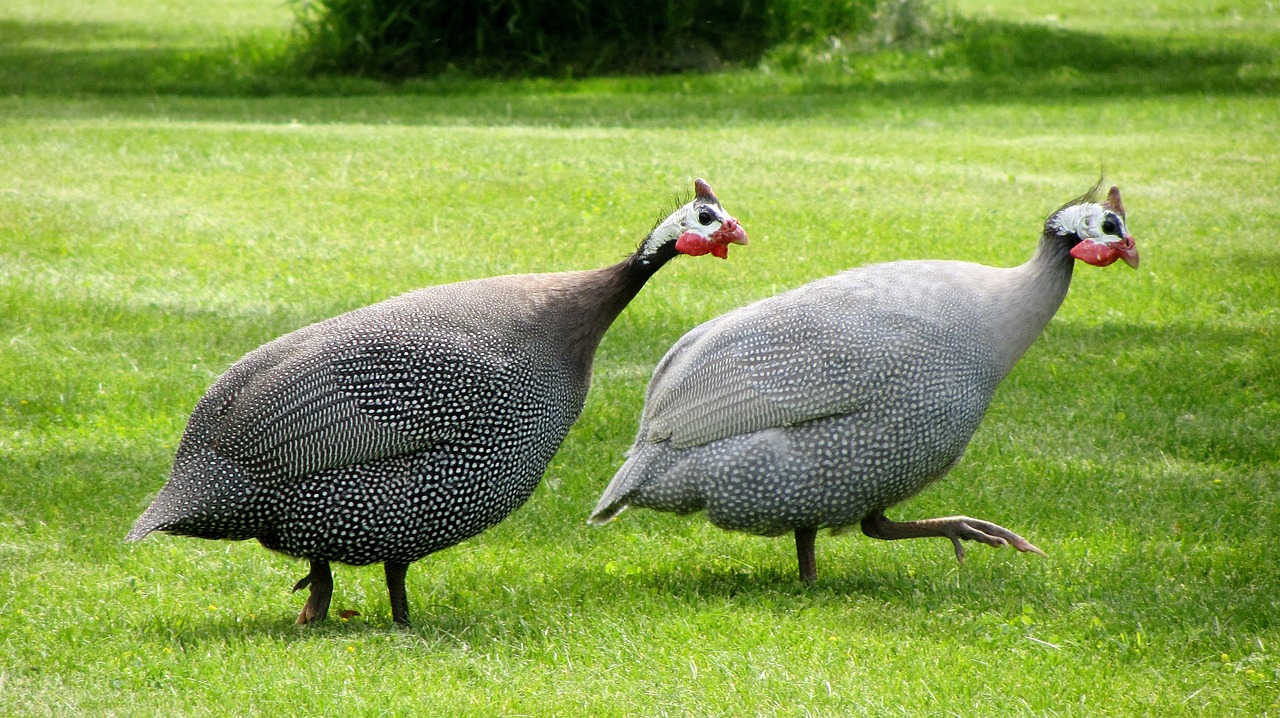
People told me chickens were funny. They were right.
People told me goats were funny. They were right.
But no one ever told me how funny guineas are to watch.
When they shuffle up and down the driveway looking for bugs, it is an adorable sight.
Watching a guinea outsmart a cat and then running it off is a funny sight.
Guineas just add one more funny thing to watch while you are out on a homestead. It is nature’s free entertainment.
12. Guineas Are Low Maintenance Birds
Guineas don’t have to have a coop.
They forage for their food.
Guineas don’t need nesting boxes.
Yes, a coop is a good idea as we discussed previously.
But in all actuality, guineas are super low maintenance. There are no nesting boxes to clean, no large coop to maintain.
They are just happy to fly around your property and eat your bugs.
You don’t get much more low-maintenance than that.
Having these amazing birds as part of your homestead will give it a complete feeling.
Yes, they have their pros and cons, but from my personal experience, I wouldn’t trade my guineas.
They have been much more of a help around our homestead than a hindrance.
Here are some excellent beginner guides on raising guinea fowl, if you decide to get one yourself:
- Raising Guinea Fowl: All you need to know to do it right
- Everything You Want To Know About Guinea Fowl Eggs
- Raising Guinea Fowl — University of Kentucky
